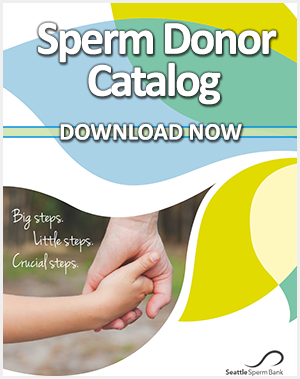Using a sperm bank is a positive and effective method for conceiving a child. But there are many things to consider first. Below are 30 of the most common and important questions we are regularly asked. If you have any questions that are not addressed in this list, please contact Seattle Sperm Bank (SSB) directly for answers and assistance.
What do you do as a sperm bank if a donor reports a medical or genetic issue, or if a child born using one of your donors has a medical or genetic issue?
If a donor child is born with a genetic issue, we immediately stop distribution of the donor sperm and investigate the cause. If it is determined that the donor was the cause, we permanently discontinue using that donor and notify all physicians treating recipients who have used this donor.
Additionally, if a donor informs us of any major change to his medical history we will also perform an investigation. Any units remaining from that donor would be refunded at 100% of original cost, or a substitution would be offered.
What do you do if a donor tests positive for HIV after vials have been purchased?
If a donor tests positive for any infectious disease, including HIV, his units are not released from quarantine for distribution. Instead, they are destroyed.
How do you verify the donors’ medical information to make sure it’s accurate?
All donors provide us with a complete family medical history assessment going back three generations. This information is then compared to all relevant medical information including what we find from blood tests, physical exams, and counseling.
Are donors allowed to know their donor number?
Yes, this information is given to all donors.
How often are your donors tested, and how often are their medical histories updated?
Our active donors are given complete physical exams every six months. Retired donors are contacted annually to verify contact information and to see if there have been any changes to their health history. All information is then updated in our database.
What happens if vials of donor sperm you are using are lost by the sperm bank?
If any vials are lost, we offer a no cost substitution, and any storage and vial fees are refunded in full.
What compensation do you offer if your donor sperm is contaminated or has low motility?
When you work with the Seattle Sperm Bank, every properly thawed intrauterine insemination (IUI) vial contains at least 10 million motile cells in a 0.5 ml volume, and every intracervical insemination (ICI) vial contains at least 15 million motile cells in a 1.0 ml volume. We perform a post-thaw count on one vial from every lot to confirm the sperm survive the freezing process and still meet our high standards.
To account for differences in counting methods and the various types of equipment used to do so, there is a 20% acceptable variance from the count made by the receiving clinic compared to our post thaw count. If the insemination does not result in pregnancy and the quality of your vial is in question, clients are encouraged to complete and return our Quality Complaint Form so we can do a thorough evaluation.
What type of records do you maintain, and how long do you keep them?
We maintain both paper and electronic records, and all records are kept indefinitely.
What happens if my donor tests positive for HIV after I have already bought vials of his semen? Will I be notified?
If your donor tests positive for any infectious disease, his units would not be released from quarantine for distribution. No notification would be necessary because any units that are not released from quarantine are immediately destroyed, and the donor would no longer be eligible to donate.
What is SSB’s policy on creating large sibling groups? What tracking system do you have in place?
The Standard Operating Procedure at the Seattle Sperm Bank limits us to a maximum of 25 families per sperm donor in the entire United States. The American Society of Reproductive Medicine (ASRM) sperm donor guidelines are 10 births per population of 800,000, so our limit is substantially lower than the ASRM guidelines. We also adhere to any country-specific limits for donors whose specimens are exported.
If you are concerned about a limit of 25 families, there are sperm donors who were in our program at SSB for a short time (retired due to moving, graduation, marriage, etc.), or have low unit production. On request, we can provide a selection of sperm donors who will have a low number of offspring.
To further support our efforts to limit births, we actively encourage our clients to complete our pregnancy or birth report as soon as they become pregnant and/or give birth. This helps us enforce our existing reasonable limits.
Do you ask donors if they have donated sperm elsewhere?
Yes. Plus, our consent form, which all donors are required sign, obligates them to notify us before donating sperm anywhere else once they leave our program.
Can potential clients visit SSB to see where vials are stored?
Yes, we welcome your tour requests!
When I purchase a vial, do you confirm the types of screening done on my purchase?
Every vial of semen shipped to you includes a summary of all screening tests performed on the donor. We also keep copies of proof of screening, and can provide them to you at any time.
What happens if a donor is found to have lied on their application?
If we learn that a donor lied on any part of their application, they are immediately and permanently disqualified from our program. Further, all families who may have purchased vials from this disqualified donor will be notified via the contact information provided to us at the time of their purchase.
Is SSB in compliance with all Health Insurance Portability and Accountability Act (HIPAA) and U.S. Food and Drug Administration (FDA) regulations?
Yes, we adhere to all HIPAA and FDA regulations. Also, all patient records are maintained on our premises, and records cannot be accessed remotely.
Do you inform a recipient if a donor is cytomegalovirus (CMV) positive?
The CMV status of all donors is listed on our online database as well as listed with the summary of records sent with each shipment. Learn more about CMV and how it can affect a pregnancy.
Are your donors told their own donor number?
Yes, all donors are given of their donor number.
Is the donor number given to donors the same as the number given to the recipients?
Yes.
What education and counseling do you provide donors?
SSB is the only sperm bank to offer all donors free counseling from a counselor with a Masters of Social Work degree. This support helps donors understand the full implications of being a donor, including future contact with offspring, and gives us the assurance that the donors in our program are sound and safe individuals.
Does SSB distribute information on the Donor Sibling Registry?
We do not, because SSB has its own program, called SSB Connects, which is our version of the Donor Sibling Registry. Our registry helps facilitate mutually desired contact between families who share a common donor. Access to SSB Connects is limited to SSB clients with reported births.
Postings on this system are not accessible to Google or other search engine queries, and are not available to the general public. Protecting our clients’ privacy is a top priority. We do not charge any fees for joining SSB Connects. It is free to all SSB clients who submit a birth report to us using our Pregnancy and Birth Reporting Form. Please note in the comments if you want access to SSB Connects.
Has SSB been inspected by the FDA?
Yes. Our last inspection was in June 2019 and no observations or violations of FDA regulations were noted during that inspection. Proof of this can be provided upon request.
Do you notify your donors if a medical or genetic issue is reported to you by the parent of child born via one of your donations?
If the above described investigation shows that the donor is the cause, then yes, the donor will be notified and counselled.
What proportion of your sperm donors are “open” vs “anonymous”?
At SSB, 99% of our donors are open identity (or open ID) donors. An open identity donor is one who has agreed to at least one form of contact with any donation-born offspring once the child turns 18. This is the most popular and fastest growing trend among sperm banks across the United States due to the transparency and comfort it provides. Learn more about open identity donors.
How are open identity donors notified if a child, upon turning 18, requests contact?
If a donor child requests contact, we then get in touch with the donor to find the most appropriate form of contact between the donor child and the donor. No direct contact is allowed between the donor child and the donor for the first meeting or conversation. Once this initial connection is established, the donor child and the donor are then free to establish their own communication after that.
If an open ID donor is purchased, can that donor change to an anonymous donor after the fact?
No.
Where does SSB ship donor sperm? And are you required to tell recipients where the sperm originated from?
SSB distributes donor sperm to more than 30 countries around the world. And yes, all receiving clinics, and their clients, are notified of where the donor originated from.
Watch our demonstration video to see what the shipping tanks look like when they arrive at your door, and how to thaw and use your vials for home insemination.
Are SSB employees required to sell a certain amount of sperm each month, or do they have quotas to meet? Do employees receive bonuses for selling the most sperm?
The answer to all three questions above is no.
Have any lawsuits been brought against SSB?
No.
Does SSB tell families how many vials have already been sold for their particular donor?
No, we do not share this information. Our policy limits us to a maximum of 25 families per sperm donor in the entire US (population 317 million). That limit is much lower than even the American Society of Reproductive Medicine sperm donor guidelines of 10 births per population of 800,000. We also follow all country-specific limits for donors whose specimens are exported.
If you are concerned about a limit of 25 families, we do have donor sperm from donors who were in our program for only a short time and can provide a selection of sperm donors who will have a low number of offspring.
You can help support our efforts to limit births by completing our pregnancy/birth report as soon as you become pregnant and/or give birth. Please help us enforce reasonable limits!


